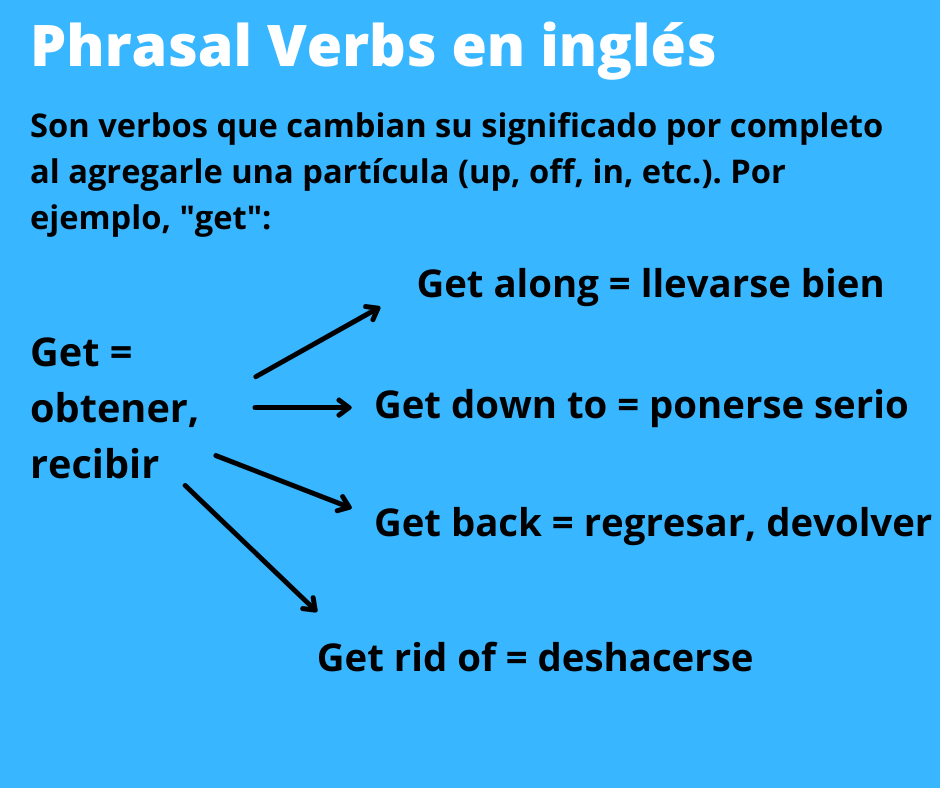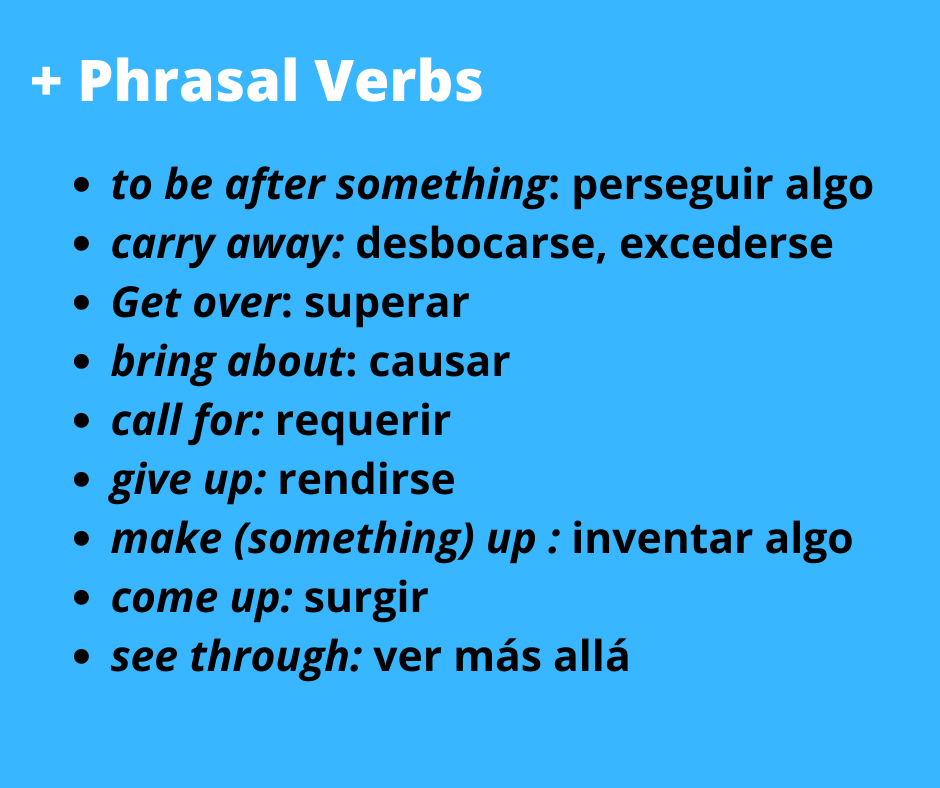¿Te interesa conocer los phrasal verbs en inglés? Si ya tienes un camino recorrido en tu estudio del inglés en casa, seguramente habrás notado que además de los verbos “normales” que aprendemos con la lista, hay verbos que se usan de forma… especial. Como “get up”, que sabemos que significa “levantarse”, pero “get out” significa salir (??)
Mientras que este “get” se puede traducir como “entender”…
Sabemos que puede parecer confuso, pero ya vamos a ver de manera muy simple qué es un phrasal verb y los diferentes significados que puede tener un mismo verbo (como el famoso “get”), con ejemplos para despejar todas tus dudas.
Los phrasal verbs se pueden usar en cualquier tiempo verbal: presente simple, pasado continuo, present perfect, etc. Y en verdad son muy frecuentes en el lenguaje hablado informal, así que esta es una manera efectiva de aumentar tu vocabulario y sonar más natural en inglés.
¿Qué Son Los Phrasal Verbs en Inglés? Definición
Los Phrasal Verbs son verbos con dos o más partes: un verbo principal y una partícula. En el ejemplo de “get up” vemos que “get” es el verbo principal y “up” es la partícula. Lo que hace únicos a estos verbos, es que mientras “get” solito se puede traducir como obtener, al añadir estas partículas (up, out, in, etc.) su significado cambia ¡por completo!

Es decir, que los phrasal verbs son verbos que cambian de significado al añadirles una partícula. Estas expresiones se usan especialmente en el lenguaje informal. En verdad, también están los prepositional verbs: que son muy, muy parecidos y por lo tanto se suelen englobar bajo la misma categoría. La diferencia entre ellos es que los prepositional verbs son transitivos -siempre tienen un objeto- y no se pueden separar en la oración, mientras que los phrasal verbs sí pueden separarse, así:
It’s time to turn your test in
It’s time to turn in your test
Vemos que en la primera frase el phrasal verb “turn in” (entregar) está separado, mientras que en la segunda, está junto a la partícula.
Look at the sunset
En este caso tenemos un prepositional verb: siempre tiene objeto (en este caso, the sunset) y no se puede separar.
Phrasal Verbs Con “Get” + Ejemplos
Veamos los diferentes significados que puede tener “get”:
| Phrasal Verb | Traducción, significado | Ejemplo |
| Get (something) across | Comunicar, dar a entender algo | I think I got my point across |
| Get along with | Llevarse bien | My girlfriend gets along with my parents |
| Get away | Escaparse, huir, irse | Don’t you want to get away from here? |
| Get away with (something) | Salirse con la suya | He got away with it |
| Get down to | Ponerse serio con algo | Let’s get down to business |
| Get back | Regresar, volver, devolver | She wants to get her sweater back |
| Get behind | Quedarse atrás | He feels like he’s getting behind his classmates |
| Get ahead | Adelantarse | I plan my week on Sunday, to get ahead |
| Get rid of | Deshacerse | We want to get rid of that desk |
| Get out | Salir | The children need to get out |
| Get together | organizarse, poner en orden / reunirse | We got together for my birthday Nos reunimos para mi cumpleaños Madeleine needs to get her stuff together Madeleine necesita poner sus cosas en orden |
| Get into (something) | Interesarse en algo | I got into cooking in 1995… |
| Get on | Montarse, subirse | Get on that bus |
| Get by | Salir adelante | These little things help me get by |
| Get over | Superar | You need to get over him |
| Get (something) right | Entender bien algo | If I get it right, you have to call them… |
| Get off (something) | Dejar algo | I got off the medications last week |
| Get to | Poder hacer algo | My husband works from home so he gets to spend time with the kids |
| Get a hold of | Contactar | I can’t get a hold of the manager |
| Get (something) over with | Terminar una tarea indeseable | Let’s get this over with |
| Get + emotion | Hace de la emoción un verbo | He got sad after we left |
Lista de Phrasal Verbs Con Ejemplos
Sabemos que “Get” es el más famoso, pero ¡ciertamente no es el único! Veamos otros phrasal verbs:
1.Phrasal Verbs Con el Verbo “To Be”:
Sí, con el verbo “to be” tenemos estas expresiones de lo más útiles:
- To be into something: estar interesado en algo. He’s into sports
- To be up: estar despierto. I was up all night reading
- To be up (to something): estar tramando algo. The children are so quiet, they must be up to something
- To be out: estar afuera de la casa u oficina. The manager is out at the moment.
- To be after something: perseguir algo. Joe is after that promotion.
- To be off: irse a otro lugar. We’re off to Vegas!
- To be against: estar en contra de. We’re against propaganda in the school.
- To be on: estar bajo el efecto de algo. He was on drugs that night.
- To be up to: ser responsabilidad de alguien. It’s up to you to decide
2. Otros Phrasal Verbs:
Más Phrasal Verbs con traducción:
- Keep from: evitar
- See through: ver la realidad, ver más allá
- Come up: surgir
- Keep on: seguir, mantener
- Keep away: mantener alejado
- Carry on: continuar
- Carry out: completar, ejecutar
- Pick up: recoger, buscar, trasladar
- Call for: requiere
- Come down to: concluir, resumir
- Turn up: aparecer
- Cut back: recortar, reducir
- Bring about: causar
- Set up: configurar, establecer
- Carry away: desbocarse, excederse
- Bring up: traer a colación, mencionar
- Call upon: convocar formalmente
- Give up: rendirse
- Set in: asentarse
- Make (something) up: inventar algo
- Pick on: molestar, acosar
- Make up for: compensar
- Turn down: rechazar
- Pick out: elegir
- Give away: traicionar
- Turn out: resultar
- Come after: perseguir
- Call off: cancelar
- Come up (with a solution): ingeniarse una solución

Tips Para Aprender Los Phrasal Verbs
Con toda esta información puedes aumentar tu vocabulario y así seguir mejorando tu inglés. Te sugerimos estas tres prácticas:
1. Busca Ejemplos
Al encontrar un phrasal verb que te llame la atención, busca bastantes ejemplos de cómo se usaría. Esto te dará una mejor idea de su verdadero significado.
2. Limita el Traductor
Si bien podemos tener una referencia por la traducción, te sugerimos que para los phrasal verbs siempre tomes en cuenta el contexto, no la traducción literal.
3. Conecta Con Inglés Auténtico
Recuerda que estas expresiones son informales, por lo que puedes encontrar más sobre ellas y cómo se usan en el inglés auténtico; es decir en tus series, artículos, películas, podcasts favoritos en inglés. Te compartimos una lista sustanciosa, pero ¡hay incluso más! Así que mantente atento para que puedas seguir aprendiendo. ¡Felicitaciones por completar este artículo!
